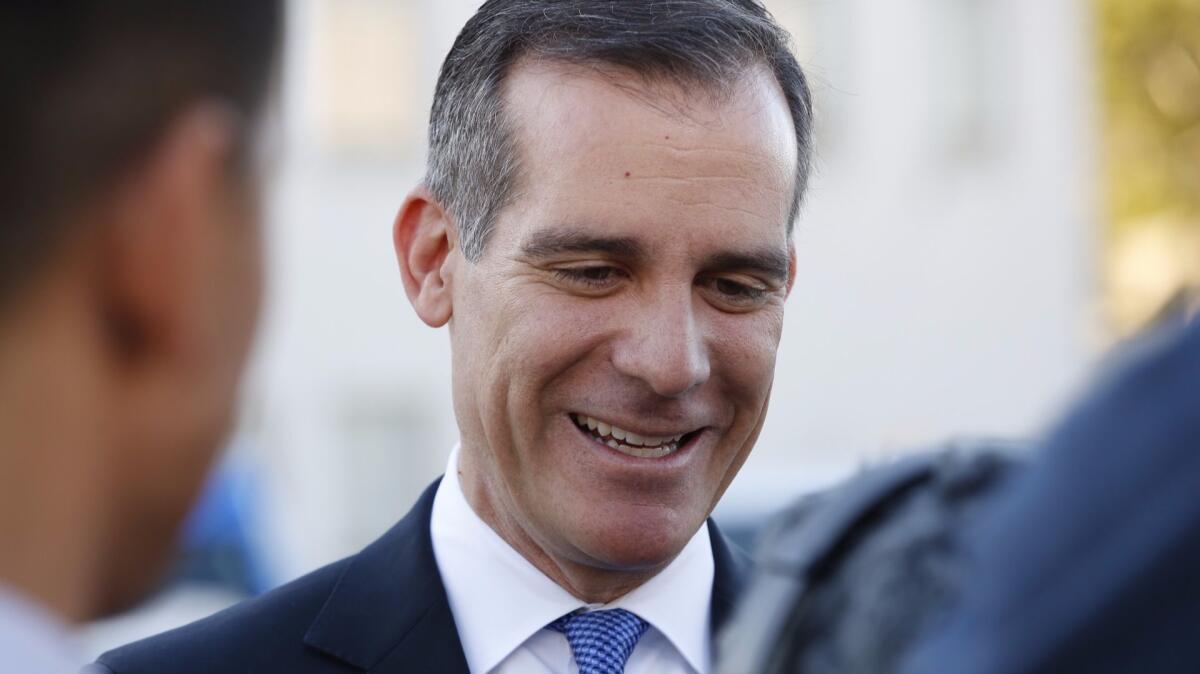Garcetti bans private meetings between developers and planning commissioners

Los Angeles Mayor Eric Garcetti has banned city planning commissioners from meeting or communicating privately with real estate developers whose plans they are vetting, following through on a pledge made last year.
The mayor, who signed an executive directive Thursday to halt the practice, said it would enhance trust in the planning process. Critics have argued that such private meetings tilt city decisions toward politically connected developers.
“We need to bring transparency and accountability to a process that, for too many, doesn’t feel like there’s enough,” Garcetti said. He signed the order two days after L.A. voters reelected him by a landslide and soundly rejected a controversial ballot measure that would have imposed new restrictions on development.
Garcetti had faced criticism for not barring such “ex parte” meetings sooner: The mayor had pledged to do so in a September letter urging AIDS Healthcare Foundation executive Michael Weinstein to abandon the push to pass Measure S, which called for a two-year moratorium on building projects that require zoning changes.
Weinstein has credited the Yes on S campaign for changing the conversation at City Hall and prodding Garcetti and other city leaders toward reform. The mayor insisted Thursday that he had been pursuing key changes before the ballot measure arose, although he acknowledged that banning ex parte communications had come up in talks with Measure S supporters.
Councilman David Ryu, who revived an old proposal to prohibit such meetings last fall, praised Garcetti for his action. “This is a major victory for transparency in local government,” Ryu said, urging the city to press forward with further reforms to limit the political influence of wealthy developers.
The ban signed Thursday applies to members of the city’s Planning Commission and the Cultural Heritage Commission, who are appointed by the mayor, as well as members of area planning commissions. They are prohibited from meeting or communicating privately with anyone about development plans unless they recuse themselves from the process.
Garcetti said that the private meetings or communications would be barred once a development project has been submitted to the city. The only exception, according to the executive directive, is for “scheduling, administrative or emergency purposes” — but only if nothing substantial is discussed and no one gets an advantage from the communication.
But Yes on S campaign director Jill Stewart said Thursday that the ban was too limited, contending such restrictions also should apply to the mayor and to members of the City Council. In a statement, the campaign said that private meetings should be banned before a developer formally files an application because “backroom meetings” could happen earlier.
“Ending ex parte communication only with his planning commissioners will have virtually no positive effect,” Stewart said.
Weinstein called the move an “important first step in beginning to curb the corruption at City Hall,” but he urged the City Council to stop meeting privately with developers as well.
“The people’s business should be done in public view,” Weinstein said.
Garcetti drew a distinction between city lawmakers and the commissioners who hold a “quasi-judicial” role — those who are required to hold a hearing and then make a decision by applying the law to the facts presented there. Last year, Garcetti said city lawyers had advised him that L.A. cannot legally prohibit residents from communicating with their elected officials.
“We hear from all sides, and we should hear from all sides,” Councilman Jose Huizar said at the Thursday news conference.
Some residents are troubled by private discussions involving other city planning officials.
The United Neighborhoods Neighborhood Council — which represents West Adams, Jefferson Park and Arlington Heights — recently raised concerns about an oil company executive communicating privately with a planning department official about the fate of a local drilling site. In a letter to city officials, the neighborhood group argued that the private communications posed a problem that “violates due process and damages us all.”
Garcetti spokesman George Kivork said that the mayor had focused the restrictions on planning commissioners, who decide the merits of a case. The planning department already prohibits zoning administrators from engaging in ex parte communications about cases before them, Kivork said.
It was unclear Thursday whether the mayor’s office had drafted a policy to ensure that Garcetti and his staffers disclose any ex parte meetings on development projects, another step that the mayor told Weinstein he would pursue.
In addition to curbing ex parte meetings, Garcetti directed the planning department to set a schedule for updating the General Plan, which governs development across the city, and reviewing the community plans, which guide what can be built in each neighborhood. The City Council recently voted to draft an ordinance that would require those community plans to be updated every six years, funded by an increased fee on building projects that need special approval from the city.
Although the ballot measure to restrict development failed, “this is not a time when we’re dancing and saying, ‘Hey, we won, we don’t have to do anything,’ ” Garcetti said Thursday.
Twitter: @LATimesEmily
More to Read
Sign up for Essential California
The most important California stories and recommendations in your inbox every morning.
You may occasionally receive promotional content from the Los Angeles Times.











